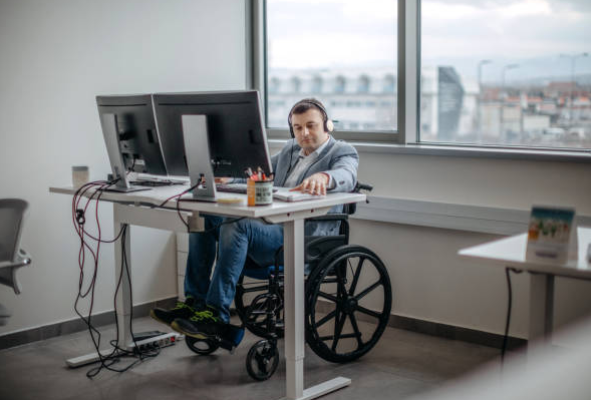Best Computer For Disabled Person
Embarking on the quest for the perfect computer can be a daunting task, especially when specific accessibility needs, like the search for a free computer for disabled individuals, take center stage. However, the ever-evolving landscape of technology has paved the way for a diverse array of options tailored to various disabilities and budgets. In this comprehensive guide, we delve into the top 10 computers, each equipped with standout accessibility features. From rugged designs to creative flexibility, these devices are designed to empower users with unique requirements. Let’s explore the intricacies of each, understanding their highlights and potential drawbacks to aid you in finding not just a device but a seamless extension of your abilities.
Top 10 Computers for Disabled Users: Navigating Accessible Tech
Finding the perfect computer can be challenging, especially when specific accessibility needs are at the forefront.

Fear not, as the tech world offers a myriad of options designed to cater to various disabilities and budgets. Here’s your comprehensive guide to the top 10 computers with standout accessibility features:
1. Dell Latitude 7424 Rugged Extreme Laptop:
For: Ruggedness, versatility.
Highlights: Durable design, large screen, multiple input options, customizable buttons.
Drawbacks: Costly.
Related Topics: Free Laptop For Disabled Child
2. Apple MacBook Pro 16-inch:
For: Visual impairments, voice control.
Highlights: Retina display, Voice Control, intuitive settings, text-to-speech.
Drawbacks: Pricey, limited ports.
3. Lenovo ThinkPad X1 Carbon Gen 10:
For: Business users, portability.
Highlights: Lightweight, excellent keyboard, extensive customization options.
Drawbacks: Smaller screen.
4. Microsoft Surface Laptop Studio:
For: Flexibility, creativity.
Highlights: Innovative hinge, touch screen, Surface Pen support.
Drawbacks: Pricey, fingerprint magnet.
5. HP ZBook 15 G8 Mobile Workstation:
For: Power users, demanding tasks.
Highlights: Powerful processor, sturdy build, configurable with accessibility features.
Drawbacks: Bulky, expensive.
6. Asus Chromebook Flip CX5500:
For: Students, budget-conscious users.
Highlights: Affordable, Chrome OS accessibility features, 2-in-1 design.
Drawbacks: Limited storage, less powerful.

7. Apple iPad Pro 12.9-inch:
For: Mobile users, creativity.
Highlights: Large Liquid Retina display, Apple Pencil support, iPadOS accessibility features.
Drawbacks: Smaller screen, multitasking limitations.
8. Microsoft Surface Go 3:
For: Portability, affordability.
Highlights: Compact, detachable keyboard, Windows 11 accessibility features.
Drawbacks: Smaller screen, less powerful.
9. Acer Aspire 5:
For: Everyday use, value for money.
Highlights: Budget-friendly, decent performance, Windows 11 accessibility features.
Drawbacks: Slightly lower build quality.
10. Google Pixelbook Go:
For: Chromebook enthusiasts, portability.
Highlights: Lightweight, Chrome OS accessibility features, long battery life.
Drawbacks: Limited storage, less powerful.

In your pursuit of the perfect computer, consider the features aligning with your accessibility needs. Technology, when tailored to unique requirements, becomes an empowering tool.
Continue Exploring: Training Programs For Disabled Individuals In Tech
Conclusion
In the vast landscape of accessible technology, these top 10 computers stand as pillars of inclusivity. Each device offers a unique set of features, ensuring that individuals with diverse abilities can find a seamless technological companion. As we celebrate the advancements in accessibility, let these computers not just be tools but instruments that amplify the potential of every user. In embracing such innovation, we pave the way for a future where technology truly serves everyone, breaking down barriers and fostering a more inclusive digital realm.


